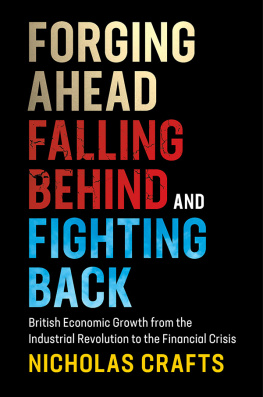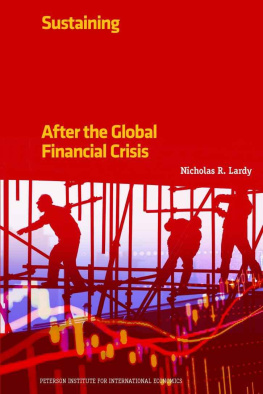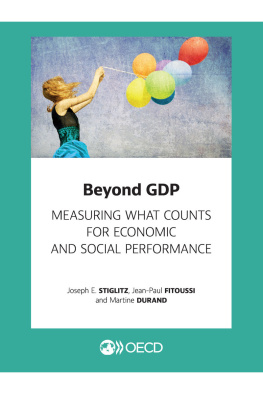To what extent has the British economy declined compared to its competitors and what are the underlying reasons for this decline? Nicholas Crafts, one of the worlds foremost economic historians, tackles these questions in a major new account of Britains long-run economic performance. He argues that history matters in interpreting current economic performance, because the present is always conditioned by what went before. Bringing together ideas from economic growth theory and varieties of capitalism to endogenous growth and cliometrics, he reveals the microeconomic foundations of Britains economic performance in terms of the impact of institutional arrangements and policy choices on productivity performance. The book traces Britains path from the First Industrial Revolution and global economic primacy through its subsequent long-term decline, the strengths and weaknesses of the Thatcherite response and the improvement in relative economic performance that was sustained to the eve of the financial crisis.
Nicholas Crafts is Professor of Economic History at the University of Warwick. His many publications include The Great Depression of the 1930s: Lessons for Today (2013), co-edited with Peter Fearon, Work and Pay in Twentieth Century Britain (2007), co-edited with Ian Gazeley and Andrew Newell, and British Economic Growth During the Industrial Revolution (1985).
University Printing House, Cambridge CB2 8BS, United Kingdom
One Liberty Plaza, 20th Floor, New York, NY 10006, USA
477 Williamstown Road, Port Melbourne, VIC 3207, Australia
314321, 3rd Floor, Plot 3, Splendor Forum, Jasola District Centre, New Delhi 110025, India
79 Anson Road, #0604/06, Singapore 079906
Cambridge University Press is part of the University of Cambridge.
It furthers the Universitys mission by disseminating knowledge in the pursuit of education, learning and research at the highest international levels of excellence.
www.cambridge.org
Information on this title: www.cambridge.org/9781108424400
DOI: 10.1017/9781108334907
Nicholas Crafts 2018
This publication is in copyright. Subject to statutory exception and to the provisions of relevant collective licensing agreements, no reproduction of any part may take place without the written permission of Cambridge University Press.
First published 2018
Printed in the United Kingdom by TJ International Ltd. Padstow, Cornwall
A catalogue record for this publication is available from the British Library.
ISBN 978-1-108-42440-0 Hardback
ISBN 978-1-108-43816-2 Paperback
Cambridge University Press has no responsibility for the persistence or accuracy of URLs for external or third-party internet websites referred to in this publication and does not guarantee that any content on such websites is, or will remain, accurate or appropriate.
Contents
Figures and Tables
Figures
Tables
Acknowledgements
This book has been developed from the Ellen McArthur Lectures which I gave at the University of Cambridge in 2009. I was honoured by the invitation to give the lectures. The opportunity encouraged me further to explore themes in my research which had not previously been thought through, especially with regard to the implication of Britains early start as an industrial nation.
When I presented the lectures I received excellent support from Martin Daunton and Leigh Shaw-Taylor. Martin Daunton and Tim Leunig read a draft of the book and made valuable suggestions. Michael Watson at Cambridge University Press has been supportive throughout and has been astonishingly patient with my slow progress in delivering the manuscript. I am grateful to all of them.
Introduction
This book examines the British economys growth performance over the last 250 years. The focal point is to offer an interpretation informed by ideas from growth economics, and firmly grounded in empirical evidence of the relative economic decline that characterized the period from the mid-nineteenth century, when Britain had the highest per capita income of any major economy, to the early 1980s, when this had fallen below the West-European average. This will entail an analysis of the experience of economic growth from the Industrial Revolution to the eve of the financial crisis which erupted in 2007.
The concept of relative economic decline relates to international comparisons of the level of real Gross Domestic Product (GDP) per person. As applied to Britain, it means that over many decades economic growth was slower than in a peer group of other countries, with the result that they first caught up, and then overtook, British income levels. As is reported in , this describes the economic history of the post-Industrial Revolution period through the 1970s. Relative economic decline was most apparent vis--vis the United States, from the American Civil War to 1950 and, compared with European countries, during the 1950s to the 1970s.
Table 1.1 Real GDP/person (UK = 100 in each year)
| USA | Germany | France |
|---|
| 1820 | 65.6 | 51.9 | 54.7 |
| 1870 | 76.6 | 57.6 | 58.8 |
| 1913 | 107.7 | 74.1 | 70.8 |
| 1929 | 125.3 | 73.6 | 85.6 |
| 1937 | 103.4 | 75.3 | 72.2 |
| 1950 | 137.8 | 61.7 | 74.7 |
| 1979 | 142.7 | 115.9 | 111.1 |
| 2007 | 132.9 | 107.0 | 98.6 |
Notes: Estimates refer to West Germany in 1950 and 1979. Purchasing power parity estimates in $1990GK for 18701979 and in $2015EKS for 2007.
Sources: .
Relative economic decline did not mean that British economic growth slowed down. On the contrary, as is shown in was rather that growth in other countries increased by more than in Britain as faster technological advance became possible.
Table 1.2 Growth rates of real GDP, population and real GDP/person (% per year)
| GDP | Population | Real GDP /person |
|---|
| 15001650 | 0.59 | 0.60 | 0.01 |
| 16501780 | 0.71 | 0.24 | 0.47 |
| 17801820 | 1.43 | 1.22 | 0.21 |
| 18201870 | 2.12 | 1.24 | 0.88 |
| 18701913 | 1.90 | 0.89 | 1.01 |
| 19291937 | 1.99 | 0.44 | 1.55 |
| 19501979 | 2.63 | 0.40 | 2.23 |
| 19792007 | 2.54 | 0.32 | 2.22 |
Note: Estimates based on England up to 1700, Britain 17001870, United Kingdom 18702007.
Sources: and The Maddison Project database.
Evidently, growth comparisons, whether inter-temporal or international, need to be handled with care. It is important to take into account what is feasible, and to recognize that relative economic decline). Growth of real GDP per person of around 2 per cent per year was not feasible in 1800 but quite normal 200 years later. Similarly, growth possibilities may vary across countries at a point in time because of different scope for catch-up or the inappropriateness of technological change.










